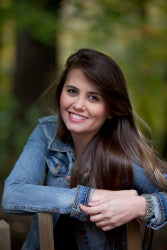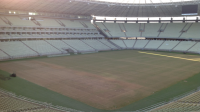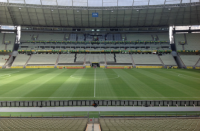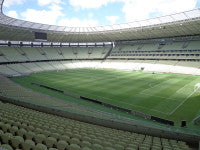FIFA World Cup 2014 - Arena Castellan

In this article, she conducts a question and answer session with one of the groundsmen responsible for football pitches in Brazil, Antônio Alves do Nascimento Filho
Renata: Please, tell us a little about yourself and your work.
I am Antônio Alves do Nascimento Filho, from Ceará state, Brazil. I'm an agronomist with a Masters Degree in Soil Science and Plant Nutrition. I work for Greenleaf Lawns Company, founded in the city of Rio de Janeiro and, for over twenty-five years, have managed sportsfields in Brazil. We were responsible for building and maintaining six pitches for the Confederations Cup.
I've been involved with sportsfields since 2008, and currently am the groundsman at the stadium Aderaldo Plácido Castelo - popularly known as Arena Castelão. During my tenure, I have been involved in the construction and establishment of the field including grading, drainage, irrigation and now maintenance.

Renata: What are the grasses and cultivars used in the stadium?
We established by sprigging 'Celebration' Bermuda grass, which is adapted to our climate. Three and half weeks after sprigging, our field had achieved ninety percent cover. We started using the field shortly after, with the inauguration on January 27, 2013 with a round of double games.
The Celebration Bermuda grass in our climate grows rapidly and responds well to fertilisation. It also accepts very low heights of cut and has held up well from the wear we have had from soccer matches. Celebration does require a high level of cultural intensity given that aggressive growth habit produces a significant amount of organic matter and thatch. We vertical cut often, among other practices, to provide a firm sports field.
The Arena Castelão is the first stadium in the Brazilian Northeast to establish Bermuda grass. Given our experience, we have no intention of replacing it. During our winter, we overseed with ryegrass (Lolium perenne). The ryegrass provides a nice colour and does better in shaded areas where the Celebration struggles a bit.

Renata: What about Fortaleza?
The city of Fortaleza, capital of Ceará state, is located in the Northeast of Brazil. It is a city with great potential for tourism. Every year we receive a number of tourists, especially from Europe. The weather is great with little climatic variation throughout the year (23-33°C). Fortaleza is a city of friendly people and beautiful beaches.
Renata: How is the groundsmanship profession in Brazil?

Renata: What is the status of the sportsfield profession in Brazil?
Unfortunately, Brazil does not offer a lot of qualification for professionals in the sportsfield area. We often study abroad to gain more knowledge. However, all the events surrounding the World Cup in 2014 has brought attention to our profession and I think it is definitely a turning point for our industry.
We are seeing a number of turf companies coming to Brazil to offer their products. Today, we can say that we have technological machines, automated irrigation, quality inputs and an improvement in the quality of labour that you would expect to find in Europe.
For us who work in the area, it is a great challenge to maintain, expand and improve the quality of sportsfields in Brazil.
It is very important to exchange information and, for this, I communicate with colleagues from other countries like the United States, Portugal, Spain, England and Holland.

I would like to use this opportunity to thank you, Renata Mundim Ribeiro and GlobalTurf Network team, for the various videos, articles and informational materials that you offer on your website. Your information has helped, immeasurably, all the sportsfield professionals in Brazil. You and your colleagues provide the most accurate information and are, frankly, our main source for turfgrass updates.
Also, thank you for the opportunity to be talking to the world about Fortaleza/CE and our stadium. I invite everyone to please come and watch the matches in the 2014 World Cup, where the Arena Castellan will welcome you with open arms.
Antônio Alves do Nascimento Filho
alves@greenleafgramados.com.br
